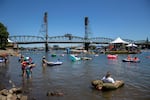An atmospheric river brought heavy rains and minor flooding to the Portland area over the weekend. The deluge overwhelmed the city’s sewage system Sunday, sending contaminated water from eight outfalls into the Willamette River between Ross Island Bridge and Swan Island.
The potentially harmful levels of sewage prompted a city-issued advisory to avoid contact with the river for 48 hours.
The last time Portland experienced such an event was in August 2019. The 16-month stretch between events is the longest since the completion of the Big Pipe — Portland’s billion-dollar overflow containment system — in 2011.
That point wasn’t lost on the Portland Bureau of Environmental Services, which is responsible for the Big Pipe.
Less than two weeks ago, the bureau announced on Twitter that 2020 could be the “first year in modern history with zero sewage overflows” on the Willamette River, asking, “Can we take a 2020 moment to share some good news in the making?”
The Bureau answered its own question in another tweet ten days later. “In a word... no.”
Can we take a 2020 moment to share some good news in the making? This year may be the first in modern history with zero sewage overflows to Portland’s Willamette River #BigPipeBigDifference https://t.co/crKeqOiGlR pic.twitter.com/g1xNNRseoQ
— BESPortland (@BESPortland) December 10, 2020
Still, BES spokesperson Diane Dulken said a day after Sunday’s combined sewer overflow, the Big Pipe has proven itself.
“Portlanders have invested in the health of the Willamette River, and that investment is working,” she said Monday. “The point is that these incidents are rare and that when there is no overflow the river’s water quality is safe for recreation.”
Just not right now.
The overflow that closed the river lasted three hours, and came after more than an inch of rain fell in a 12-hour period. Prior to the construction of the Big Pipe, it could take as little as a tenth of an inch of rain in one day to overwhelm Portland’s system.
The Bureau of Environmental Services said the Big Pipe Project has reduced combined sewage overflows by 94% in the Willamette River and 99% in the Columbia Slough. Before the Big Pipe Project, Portland averaged 50 combined sewage overflows into the river per year.
The $1.4 billion infrastructure project started in 1991 after the city was sued for Clean Water Act violations. The cornerstones of the project were three large pipes built to contain sewage that would otherwise flow into the river. But peripheral projects have also helped. Homeowners in overflow areas disconnected rain gutter downspouts from the sewage system, which keeps roughly 1.2 billion gallons of stormwater out of sewers each year. The city also installed rain gardens and diverted streams.
Dulken said the addition of the Big Pipe Project to the overall system has had other benefits besides preventing combined sewage overflows into the Willamette and Columbia rivers.
“They bring a lot more capacity to our system, our network of pipes,” Dulken said. “They help us store and then send that mix to the treatment plant and do it in a staged way, so we don’t overwhelm our treatment plant.”
It’s also been helping to prevent sewage from backing up in people’s homes, she said.
Portland’s last combined sewage overflow in August 2019 lasted 15-minutes, sending an estimated 60,000 gallons of overflow into the Willamette River.
Dulken attributed the Big Pipe Project to increased recreation in the city’s stretch of the Willamette River.
“So, as sewage has gone out of the system and out of the river, people have come in and started swimming and paddling and playing,” she said.

The 8th Big Float event, taking place in front of the Hawthorne Bridge at the Tom McCall Waterfront Park in downtown Portland, Ore., is hosted by the Human Access Project to encourage people to swim in the Willamette River.
Miranda Daviduk/OPB
Willie Levenson has helped lead the effort to change people’s relationship with the river as the Big Pipe Project has come along. He founded the Willamette River’s Human Access Project and has given himself the title of “ringleader” for the organization. It’s worked for years to educate people about the river’s improving ecological health and to encourage recreation in the Willamette. The Human Access helped create the annual Big Float event.
Levensen said he’s looking forward to celebrating a full calendar year without sewage overflowing into the Willamette.
“It’s actually extremely unusual to be in a situation where you have a population of our size without a sewage overflow,” he said.
The Chicago River is plagued by sewage overflows, and runoff events regularly close beaches in California and Oregon. Headlines about downpours leading to “poopy beaches” are common in Florida newspapers.
Levenson said every year there has been less and less sewage entering the river. Prior to this weekend’s rains, Levenson said he knew this streak would be broken at some point.
“Overflows used to be the way things were,” Dulken noted. “Now they’re so rare that when they occur, it gets news coverage.”